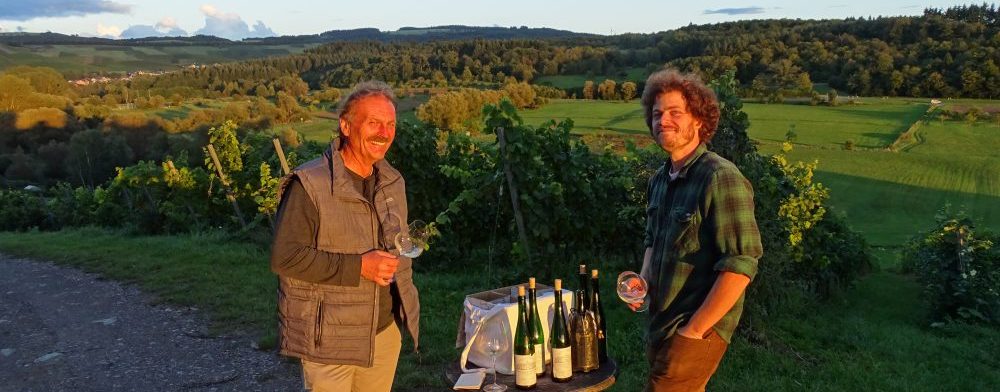



Hofgut Falkenstein is the home for ultra-traditional, dry-tasting Saar
Rieslings. The estate is run by father and son Erich and Johannes Weber.
The beginnings of Hofgut Falkenstein dates back to 1981 when Erich, after
graduating from Geisenheim, started to make wine. 1985 he bought
“Falkensteinerhof”, an old worn-down winery facility that previously was
used for education by a local school. Erich restored it himself. A highly
labour-intensive task – a symbolic start for the Weber’s as they are some
of the most hard working people we have encountered.
Today Hofgut Falkenstein have 8 hectares of vines in a side valley of the
Saar called Tälchen, meaninge “little valley”. The vineyards are spread
between the villages of Konz, Niedermennig, Krettnach and Oberemmel.
These include: Falkensteiner Hofberg, Niedermenniger Herrenberg,
Niedermenniger Sonnenberg, Niedermenninger im Kleinschock,
Krettnacher Euchariusberg, Krettnacher Altenberg, Krettnacher Ober
Schäferhaus and Oberemmeler Karlsberg. These are all vineyards that
historically have played a big role in the region. In more modern days they
unfortunately had their perceived importance and acclaimed fame
diminished by the 1971 German wine law. The new rules set in place
consolidated many vineyard sites under one name, some times even
vineyards from different villages. A devastating turn of events for those
seeking to pronounce true Terroir in their wines.
Luckily enough that has all changed, and the Weber’s are largely to
thank for bringing back fame to these specific villages and vineyards they work in. The average age of the vines range between 40-80 years old of which amazingly 40 %(!) are ungrafed. The Webers work close to organic, except for preferring certain synthetic sprays to Bordeaux mix since copper is a heavy metal that can build up in the soil with highly negative effects.
Yields are low because of a low-density planting and strict harvesting from
old vines. Key word at the estate is minimal intervention: whole-bunch pressing, juice is moved by gravity only, fermentations occurs spontaneously at cool temperatures in 1000-litre fuder, no use of commercial yeast, enzymes, protein stabilizers, clarifying agents, no chaptalization, concentration or de-acidification.
It is not rare that the wines contain two-digit acidity figures. Most of the wines end up either naturally dry, trocken, or off-dry feinherb.
Hofgut Falkenstein, therefore, is one of the rare Saar producers that specializes in distinctive, bracing, light, dry Rieslings, bottled traditionally by the cask. All the fuder are bottled separately, which was the norm back in the day but today almost is completely unknown.
These are rare wines in their conception, produced in an incredibly old
fashioned and traditional way which is almost abandoned in the Mosel.
Falkenstein’s style of light bodied wines are also rare, marked by a dry
razor like quality that is unique even in the Mosel. An important word at
the estate is bekömmlich, a German word describing a wine as easily
digestible – hence the wines are full of elegance, finesse in a harmonious
suit of lightness. Of course, the rarity of these wines increase since
availability is scarce and we are only able to get a few cases of each wine.
This is pure Rieslings for advanced palates.